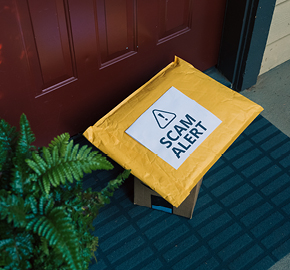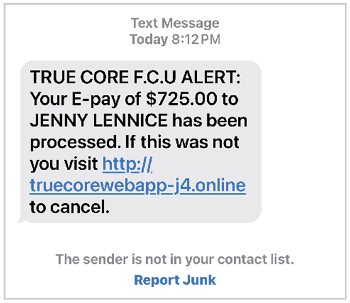TrueCore is dedicated to protecting your privacy and security. We will NEVER reach out and ask for sensitive information from you (i.e. Social Security number, personal ID, password, PIN, account number, or card number). Remember, we already have this information on file.
Have you received a suspicious text, email, or phone call? Have you noticed unusual transactions or activity on your TrueCore accounts or digital banking? If you're unsure about a call or a link, hang up or stop and verify with us first. Do not offer information or click any external links. Instead, please reach out to our central fraud reporting email at fraudreporting@truecore.org.
Click here to read more about ID Theft: How to prevent it and how to get over it.
Phone/text scam (April 19, 2025): TrueCore has received several calls concerning members receiving a phone call or text message stating suspicious activity charges from target.com and Lakep#98. The scam text includes a link to click if the transaction was not authorized.
If you are contacted in a manner similar to this, please do not respond and instead call us directly at 740-345-6608 or 800-333-2465 or send us an email at fraudreporting@truecore.org to inquire about your card status.
Brushing Scams (September 27, 2024): Brushing scams happen when unethical businesses find your name and address online and use the information to send you their product. The unordered package arrives at your door and probably doesn’t have a return address included. These businesses try to trick you into scanning a QR code, giving them unauthorized access to your phone, or writing positive reviews to inflate their sales.
If getting free stuff seems like a harmless surprise, you may want to think about how a random company got your name and mailing address. Sometimes this happens when businesses get your personal data from marketing companies, online databases, or even social media. They could also get your info from a data breach, and that could include other sensitive information like your bank account info, account passwords, or Social Security number.
If you have received an unsolicited Amazon package and have confirmed no one you know sent you a gift, here’s what you can do to protect yourself and future potential victims:
- Report the unordered package to Amazon customer service at (888) 280-4331.
- Report the scam to the Federal Trade Commission online or by phone at (877) 382-4357.
- Change the password on your Amazon account and any other accounts that have the same password.
- Keep a close eye on your credit card statements to spot suspicious activity.
Do not pay for an unsolicited package. If the sender calls with a bill, they are trying to scam you again.
~Excerpts from Clark.com 7/17/2024
Phone/Text scam (June 6, 2023): TrueCore has received several calls concerning members receiving a phone call or text message stating their card has been blocked and certain transactions need to be verified before it can be unblocked. They are asking for online IDs, passwords, account numbers, and full or partial card numbers. We will NEVER ask for your personal information in this manner.
If you are contacted in a manner similar to this, please do not respond and instead call us directly at 740-345-6608 or 800-333-2465 or send us an email at
fraudreporting@truecore.org to inquire about your card status.
Scams to watch out for:
Smishing is a type of phishing scam that uses text messages to trick people into sharing personal information. Scammers often send messages that appear to be from a trusted source, such as a credit union, bank, or a government agency. Below is an example.
TrueCore will never reach out in this way. Do not click on the link, and report the text as junk.
Small Business scams Small business owners often get calls, emails or letters from scammers trying to steal their sensitive information. Please call us before you commit to anything out of the ordinary. Read more from the SBA
here.
FedEx / Amazon scam There's always a new scam to look out for, and like most of them these days, it comes through your phone. Whether it's an email, a robocall, or a text, there are plenty of ways for dishonest people to try to trick you out of your hard-earned money.
- One of the latest involves a text which appears to be from FedEx asking you to "set delivery preferences" for a package you have coming. Now, in this day and age, we get packages so frequently it can be hard to keep track of when your last order is expected to arrive. It's entirely possible to assume the text is about a recent legitimate purchase and to have the immediate impulse to open the link.
Once you click on the link, you are taken to a fake Amazon page offering you a reward for taking a survey. That should be your first clue something is wrong because it didn't take you to a tracking page for FedEx, and the URL, of course, doesn't read Amazon.com.
Next, it gives you a choice of "free" rewards to choose from, but here's the catch, you're going to have to pay shipping, which involves entering your credit card information. Not only are you handing over your credit card info, but hidden in the fine print, it says you're agreeing to sign up for a 14-day free trial. Once the trial ends, the charges begin, and you'll be charged $98.95 every month for a new supply of that "free" reward you chose.
This is just a friendly reminder to always stay hyper-vigilant when receiving an email or text with a link. If possible, avoid clicking links and go to the website yourself to check the tracking or other info, and always block the number or email if the message is clearly spam or a scam.
IRS scam There has been an increase in scams targeting taxpayers during this tax season. Scammers claiming to be IRS employees, with fake names and identification numbers, will call victims saying that they owe money to the IRS. They claim that the money must be paid promptly via gift cards or a wire transfer and threaten the victim with arrest, deportation or suspension of a business or license if they don't pay the amount. They may also try to trick the victim into sharing private information over the phone.
There has also been a surge in email phishing and malware scams. Thieves will use the IRS name or logo to try to gain access to a consumer's financial information. Be alert to emails from your tax professional that request information for an IRS form. These emails could also contain links to bogus web sites that are made to look official.
The IRS will never contact taxpayers by email, text messages or social media channels to request personal or financial information. Please be alert to these types of scams. To view a full list of reported scams,
click here to visit the IRS official website.
FTC scam: Someone pretending to be from the Federal Trade Commission (FTC), is sending out fake emails telling people that their Do Not Call registration is expiring. The emails use the FTC's logo and send people to a phony Do Not Call website to register their numbers again. Do Not Call registrations never expire. Once you add a number to the Do Not Call Registry, you don't need to register it again -- ever. The number will only be removed if you ask to remove it. -- consumer.ftc.gov, January 26, 2018
Sheriff Office phone scam: Licking County residents are being warned of a scam in which callers pose as the Licking County Sheriff's Office and solicit money. According to an email sent from LCSO Sheriff Randy Thorp, the office is not soliciting funds over the phone. If a resident receives a call from the "sheriff's office" or a "Sgt. Carson" asking for money, the call is a scam.
Vishing scam: Credit Union members in Ohio, Indiana, Kentucky, and Virginia are being targeted in a vishing (phone-based phishing) scam in which fraudsters spoof phone numbers making the calls appear to originate from the credit union. The members are duped into providing CVV2/CVC2 codes and expiration dates for their debit cards. The fraudsters, already possessing the counterfeit mag stripe debit cards, use the information to change the PINs through voice response units. Then, they use the counterfeit cards to make ATM withdrawals, as well as purchases at Wal-Mart in Florida and Georgia.
TrueCore is dedicated to protecting your privacy and security. We will never reach out and ask for sensitive information from you via email (ie., Social Security Number, Personal ID, Password, PIN or account number). Remember, we already have that information, so there is no need for us to ask for it again.



